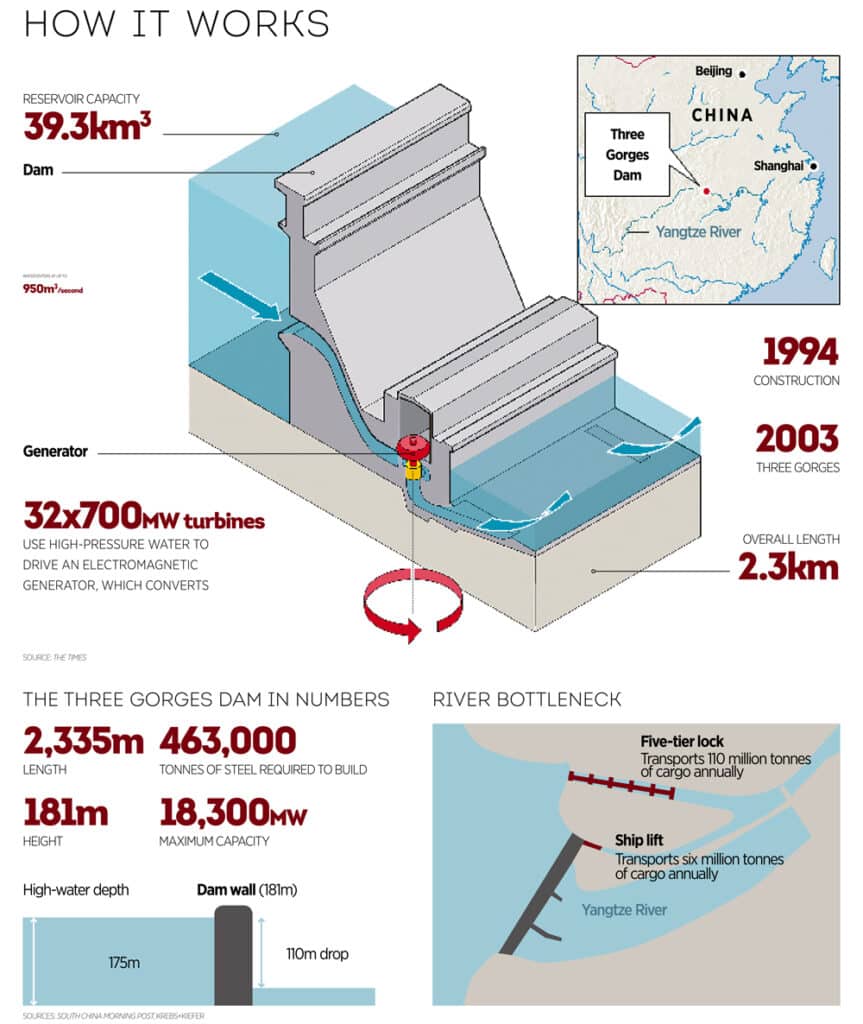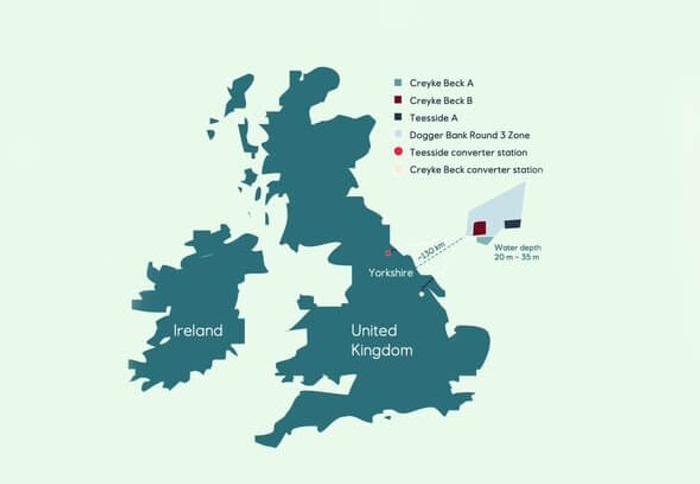Renewable Energy Projects: Powering a Sustainable Future
Source: ESG News
05 September 2024 – by Eric Koons
Renewable energy projects are essential in global decarbonisation efforts, primarily as countries work towards the ambitious goals of the Paris Climate Agreement.
Many countries have committed to expanding renewable energy resources and achieving net-zero carbon emissions by mid-century to meet these targets. This requires a massive scale-up of renewable energy infrastructure to fill the gap left by phasing out fossil fuels. As a result, these projects are crucial for reducing carbon footprints and enabling the global transition to a sustainable energy future.
What Are the World’s Largest Renewable Energy Projects?
China leads the world in renewable energy capacity and growth. This is highlighted by its position as having several of the world’s largest renewable energy projects.
The Three Gorges Dam: China’s Hydroelectricity Giant
Currently, the world’s largest hydroelectric power station is the Three Gorges Dam in China, which was completed in 2012. The dam spans 2.3 km across the Yangtze River and has an installed maximum capacity of 22.4 GW. However, its power generation relies on water flow, which can be variable.

The Three Gorges Dam also provides additional benefits such as flood control, improved river navigation and water supply, making it a cornerstone of China’s renewable energy infrastructure.
The World’s Largest Wind Farm: Gansu Wind Farm
The Gansu Wind Farm in China is currently the world’s largest onshore wind energy project. Located in the remote Gobi Desert, the site receives high levels of solar irradiation, giving it an installed capacity of over 10 GW, with plans to expand to 20 GW in the coming years. The project comprises around 7,000 wind turbines.
The Gansu Wind Farm is critical to China’s renewable energy strategy, generating enough electricity to power 1 million homes. However, the project has faced challenges, such as grid integration issues, which have led to curtailment rates of around 40% in some years.
Top Renewable Energy Projects 2025
As we look towards the future, several upcoming renewable power projects will be game-changers in the energy industry by 2025.
Dogger Bank Wind Farm: The Largest Offshore Wind Project
The Dogger Bank Wind Farm consists of three sections ranging from 125 to 290 km off the northeast coast of England. Each section will have an installed capacity of 1.2 GW, reaching a total of 3.6 GW when fully operational. The first two sections are scheduled to be operational in 2025, with the third section coming online in 2026. When fully operational, it will be the world’s largest offshore wind farm and provide clean energy to over 6 million homes.

Desert Bloom Hydrogen: The Future of Green Hydrogen
An innovative project set to launch by 2025 is the Desert Bloom Hydrogen project in the Australian Outback. The project uses solar power and water from the air to produce green hydrogen with electrolysis. With an initial capacity of 410,000 tonnes per year, Desert Bloom Hydrogen will be a significant boon to the global supply of green hydrogen. Green hydrogen is a critical component of the global push to net zero as it is one of the primary substitutes for fossil fuels in hard-to-decarbonise industries like steel production and heavy transport.
The project will employ a novel water-harvesting technology to operate in arid environments without relying on local water resources. This project is particularly important, as it addresses both the energy and water challenges in one of the world’s driest regions, making it a key test case for future green hydrogen production.
Renewable Energy Development
Challenges in Development
Despite their potential, clean energy projects face significant challenges that can impede progress and damage the clean energy future.
While the LCOE of many renewable energy technologies is now equal to or lower than fossil fuels, the upfront costs are often more expensive than nonrenewable. This initial hurdle can be challenging for many developers to develop a clean energy economy, particularly in developing markets. Regulatory hurdles, such as lengthy approval timelines, inconsistent policies and overlap between regulatory authorities, can also delay project timelines and increase costs.
Lastly, integrating renewable energy into existing power grids can be challenging due to the intermittent nature of renewable energy sources like wind and solar. Furthermore, many developing countries lack fully connected and extensive grids that reach remote areas ideal for renewable energy generation. This requires more investment to extend grid infrastructure before renewable energy project development.
Solutions and Best Practices
Innovative solutions and best practices are being implemented globally to overcome these challenges. Public-private partnerships (PPPs) have emerged as a successful model for securing funding by allowing multiple stakeholders to share the financial burden. Additionally, solutions like Just Energy Transition Partnerships (JTEPs) are a way to help developing countries secure the necessary funding to increase renewable energy production. For example, Indonesia announced a JETP led by the US and Japan in 2022 that will help supply the country with USD 20 billion to invest towards its renewable energy goals.
On the regulatory front, many countries have introduced streamlined processes and clearer guidelines to facilitate faster project approvals.
Overcoming Challenges to Achieve Global Sustainability
Renewable energy projects are at the forefront of the global transition to a sustainable future. From the massive Three Gorges Dam to the cutting-edge Desert Bloom Hydrogen project, these initiatives are critical in reducing carbon emissions and meeting the world’s growing energy needs.
As the challenges with renewable energy development are addressed, the barriers to adoption will fall, increasing the development rate. These projects’ continued growth and success will play a pivotal role in achieving global sustainability goals and meeting our decarbonisation targets.
by Eric Koons
Eric is a passionate environmental advocate that believes renewable energy is a key piece in meeting the world’s growing energy demands. He received an environmental science degree from the University of California and has worked to promote environmentally and socially sustainable practices since. Eric’s expertise extends across the environmental field, yet he maintains a strong focus on renewable energy. His work has been featured by leading environmental organizations, such as World Resources Institute and Hitachi ABB Power Grids.
Read more







